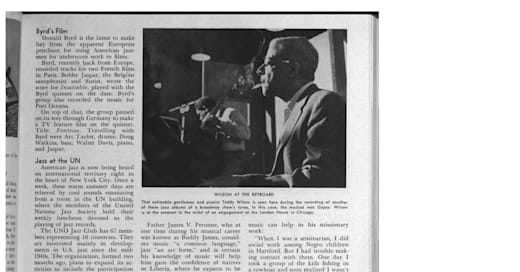(Paying Subscribers, at the bottom of this article you will find your latest bonus!)
Here is another interview conducted by our late Swedish friend Claes Dahlgren. We already heard his interviews with Miles Davis from 1951 and 1955. As with the other interviews in this series, this one has never been heard outside Sweden. It’s the first recorded interview with Cecil Taylor, and in fact up to this date only reviews of his recordings had been published. There were not even any printed interviews with him until 1961, to my knowledge.
In this recording there is no introduction, and there are no closing words in Swedish by Dahlgren—it’s all interview from beginning to end, for 11 minutes. And, unlike the Miles interviews, it was not conducted in a studio, but in the kitchen of the Five Spot Café, a famous but long-gone jazz nightclub close to the Cooper Union school in lower Manhattan. Taylor was performing there in 1959 (I will add the date here when I find it), and the interview was held during one of his breaks. In those days many jazz clubs had two bands every week, and the bands took turns performing during the evening. So one can hear the other band very faintly during the interview. (I believe that’s what we hear, but it could be an LP.) There are also some tiny silences in the audio, but the interview appears to be complete.
At first Dahlgren asks Taylor about people’s reactions to his music, and Taylor gives very minimal answers. But very soon, at 0:40, Claes asks whether he began with classical or popular music, and Cecil opens up and begins to talk at length. As the interview proceeds, when pressed to say if anything “important” had happened in the past five years, Taylor notes that the following musicians had been active for more than five years: Miles, Monk, Coltrane, Ornette Coleman, and himself. He agrees with Dahlgren that the blues is important to his music—that is “self-evident,” he says. Later, he says that composition and improvisation are “One.”
At 7:07 Dahlgren says that he was told that Taylor doesn’t like talking about his music. Cecil replies by saying, among other things, that he believes that reputation came about from a discussion held at the United Nations. He is referring to the U.N. Jazz Society, a jazz appreciation group for people who worked there that was founded in 1959 by—believe it or not—the late trumpeter Bill Dixon! In a Metronome magazine news item, Taylor is listed as one of the musicians who played a Friday afternoon concert there, and the column also says that there had been speakers there, so Taylor must have also participated in one of those discussions.
(Paying Subscribers, at the bottom of this article, keep scrolling and you will find two articles about this interesting U.N. jazz club! With my thanks!)
At 1:58, Dahlgren asks about being an “advanced musician.” Taylor asks what does “advanced” mean? What is advanced, or “retarded”? He brings up Tatum and Fats Waller—it’s a little unclear why, but I believe he is making the point that even some earlier eras produced what one might call “advanced” musicians. Finally, when asked if it’s difficult for him to get work, Taylor says that the answer is “self-evident”: ”This is my 2nd or 3rd job in the last 12 months.” Things remained difficult for Taylor for a while longer.
We are able to hear this recording thanks to the generosity of The Claes Dahlgren Collection at The Centre for Swedish Folk Music and Jazz Research (Svenskt visarkiv). I want to personally thank Dahlgren’s son Peter Dahlgren, who has given us the permission to make these recordings available, as well as Wictor Johansson, head of the audiovisual collections, and Jörgen Adolfsson, research archivist and musician, for their kind assistance.
Please Note that permission was given Only for the audio to appear in this series—no other copying or publishing of this recording is allowed without prior approval. Let us all please honor this, in which case more interviews will be coming your way. (I promise you that I have some additional amazing ones lined up!) In short, do not post the audio of this interview anywhere else—but please do share the link to this page with everyone you know!
Here is the interview— enjoy it!:
All the best,
Lewis
Keep reading with a 7-day free trial
Subscribe to Playback with Lewis Porter! to keep reading this post and get 7 days of free access to the full post archives.


